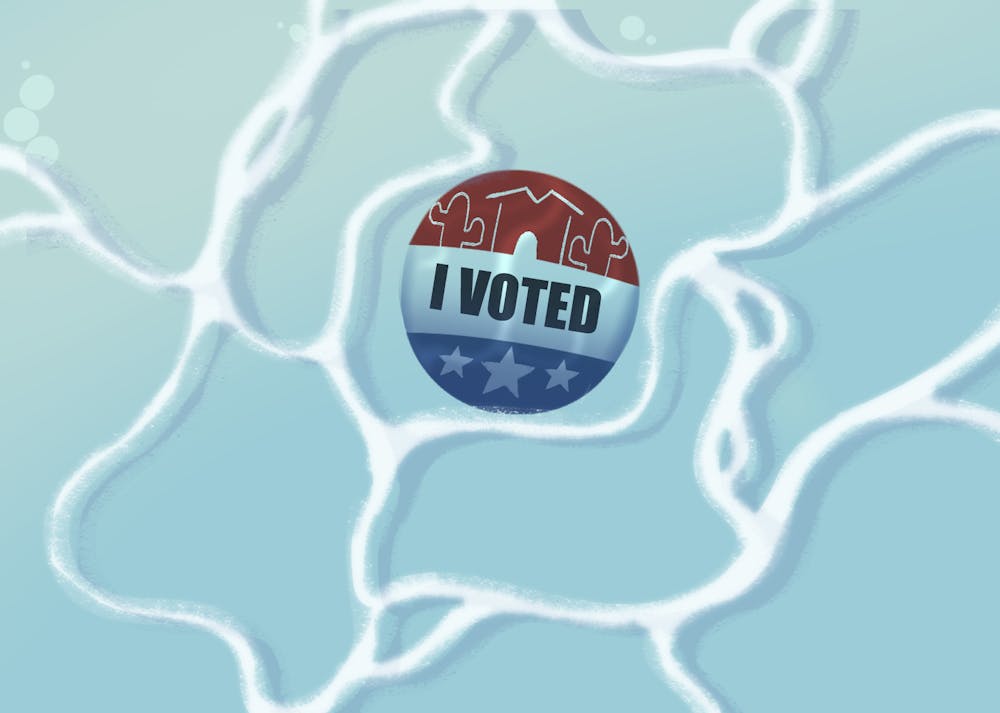Arizona is facing its worst drought in 1,200 years, but the state's water crisis isn't receiving the urgent political coverage and care it deserves.
After water levels in Lake Mead reached a historic low, the Bureau of Reclamation announced that it would cut Arizona’s river allotment by 21 percent, increasing water loss by 80,000 acre-feet from 2022.
A study published in February notes that these extreme drought conditions will likely persist through 2023, with human-induced climate change single-handedly putting the Southwest on a megadrought trajectory.
Although Arizona has implemented many water conservation efforts, it still needs policy reform and attention.
"We need innovative new approaches," said Rhett Larson, the Richard Morrison Professor of Water Law at Sandra Day O’Connor College of Law. "The shortage at this point is so serious that whatever we’ve been doing in the past is not good enough going forward."
Larson mentioned that permanent conservation measures such as using low-flow toilets and showers and removing decorative turf “will only get us so far” in the fight to preserve Arizona’s water supply.
"The vast majority of the water is used by agriculture, so even if the cities and houses made all of these fixes, it wouldn’t be enough," Larson said.
Additionally, not all parts of Arizona manage water equally – a concern that Kathryn Sorensen, the director of research at the Kyl Center for Water Policy, elaborated on.
"We have really strong, really progressive water management in central Arizona, but those rules don't apply statewide," Sorensen said. "It would be nice if rural communities had some additional tools that enabled them to better manage groundwater."
On the topic of water receiving minimal political coverage, Sorensen and Larson offered several perspectives.
"Water issues don't tend to capture public interest unless there's a crisis," Sorensen said. "It's a bit of a challenge."
According to Larsen, as our economy has diversified from being grounded in agriculture and ranching, "fewer and fewer of our civic leaders are coming from sectors that understand water, and so fewer and fewer are really water literate."
Although both Sorensen and Larson attribute the blame to general Arizona voters for not caring enough about water issues, empirical evidence suggests otherwise. 73 percent of likely voters are concerned about long-term water supplies, and prioritize sustaining waterways and rural agriculture.
It’s clear that Arizonans are aware of the water crisis in the Southwest. It’s also becoming clear that Arizona politicians are not doing enough to protect our water supply against worsening conditions.
Arizona Senator Mark Kelly, who is up for reelection this Tuesday, has identified securing Arizona's water future as one of his priorities. Republican Senate nominee Blake Masters'proposed solutions to addressing the state's water crisis including building pipelines and desalination plants, but he has not identified the water crisis as a priority in his campaign.
Even though Arizona’s water management system is exceptional, climate change is moving the goalposts, and more ambitious and effective policies need to be implemented to ensure that Arizona has water for generations to come.
The only way to do that is to go out and vote on November 8 and to hold politicians accountable for addressing the water crisis.
Edited by Sadie Buggle, David Rodish and Kristen Apolline Castillo.
Reach the columnist at mosmonbe@asu.edu.
Editor's note: The opinions presented in this column are the author's and do not imply any endorsement from The State Press or its editors.
Want to join the conversation? Send an email to opiniondesk.statepress@gmail.com. Keep letters under 500 words and be sure to include your university affiliation. Anonymity will not be granted.
Like The State Press on Facebook and follow @statepress on Twitter.
Mia Osmonbekov is a senior reporter. She previously reported for Arizona Capitol Times, Cronkite News DC, La Voz del Interior and PolitiFact. She is in her 7th semester with The State Press working previously as the opinion editor and assignment editor.




